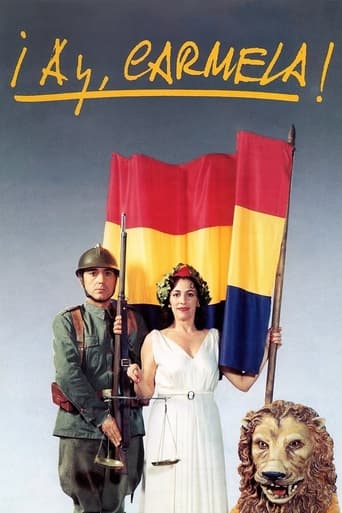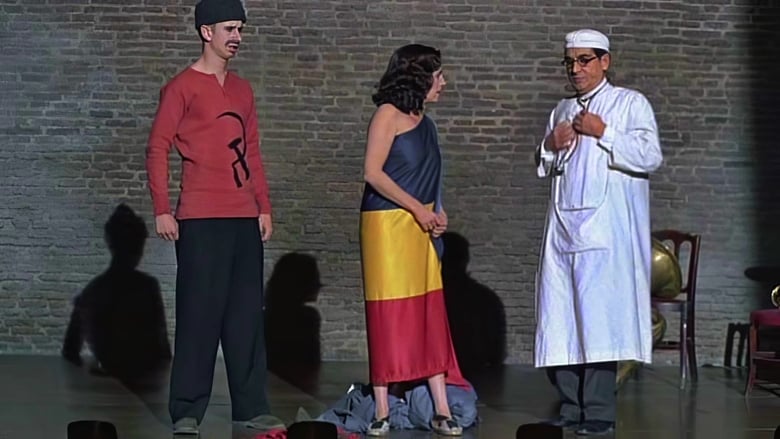

Ay, Carmela! (1990)
Paulino and Carmela are husband and wife, troubadours touring the countryside during the Spanish Civil War. They are Republicans, and with their mute assistant, Gustavete, they journey into rebel territory by mistake. They are arrested, fear a firing squad, and receive a reprieve from an Italian Fascist commander who loves the theatre. He arranges a performance for his troops, bargaining with Paulino to stage a burlesque of the republic in exchange for the actors' freedom. Will the fiery and patriotic Carmela consent?
Watch Trailer
Cast


Similar titles
Reviews
Carlos Saura is one of the most famous directors in Spain and has won countless awards. Ay, Carmela! was his 23rd film and was nominated for 13 Goya Awards when it came out in 1990. The movie is set during the Spanish Civil War. The main characters are Carmela and Paulino, a couple, and their sidekick, Gustavete, who is a mute. These three are a team of performers who put on shows for the Republican forces. During these shows, Carmela sings the song "Ay, Carmela" which was an important symbol during the times of the Civil War for the Republican forces. Carmela performs original songs as well, and each one is accompanied by a dance number, which usually play up her womanly figure and inherent sexuality. As the trio moves on towards Valencia, they get caught in a Nationalist territory and are easy targets for arrest due to their Republican flag, which is a prop from their performances. As they begin to be transported, to what they think is going to be their death, they meet an Italian lieutenant who just happens to be a fan of the theatrical arts. Due to his interest in their performances, he asks that they perform for his Nationalist troops. Paulino must quickly rewrite their scripts and songs to make it suit the other side. Polish troops that have been held captive are forced to watch the mockery of their ideals. Carmela, a dedicated Republican, is very reluctant to perform for the enemy, and struggles with the transition. In the end, she ends up shot dead by one of the Nationalist troops for her obvious love of the Republican movement. Her death causes Gustavete to get his voice back, as he screams in anguish of her death. This movie was crucial to the time that it was made because it was far enough after the Civil War that Carlos Saura, and his viewers, were finally able to find humor in the Civil War. The War brought with it many deaths, destruction, and a division of the country. The war ended with the victory of the Nationalists, which resulted in the rule of Francisco Franco for the next 36 years. Ay, Carmela was the first movie mentioning the Civil War that portrayed it in a comedic sense. The world of film was blessed when Carlos Saura decided that he could finally treat the War with humor. My only problem with the film is the way in which Carmela was portrayed. I feel that she was displayed solely as an object of sexual desire, when realistically she was extremely patriotic and was passionate about her admiration for the Republic. I think that Saura touched on this side of her, but I found that the ratio of sexuality to intellect was a little skewed for my taste. I really enjoyed watching this movie, as I found it applicable to what I know about the Spanish Civil War. I appreciate Saura's ability as a director to find humor in something that was so painful for his country, and that he was able to share it with the nation, allowing them to finally find the comedic relief that was hidden within the war. After watching this movie, I would only recommend it to those that are familiar with the contexts of Spain in the 1930s. Those of Spanish heritage, or those who have learned about it in a college course, are bound to enjoy it, due its comedic representation of something that had such a negative impact on the country of Spain. The lighthearted, upbeat, and musical tones that this film takes are truly a work of art. Though, due to the types of jokes in this film, all of which deal with the history of the Spanish Civil War, I do not think that anyone unfamiliar with the War would find much humor in it.
This acclaimed latter-day Saura effort touches on, or rather weaves together, a number of his lifelong concerns – the performing arts are here placed within the context of the Spanish Civil War. In that respect, it inevitably elicits memories of Ernst Lubitsch's WWII masterpiece TO BE OR NOT TO BE (1942) – but that film's blackly comic tones (deemed tasteless at the time) are here largely supplanted by genuinely less salubrious elements, notably grotesquerie and (unsurprisingly) eroticism!Incidentally, while the script (co-written by Saura and Rafael Azcona in what would prove to be their sixth and final collaboration) does clearly take the side of the "Loyalists" (epitomized by the recurring title song) against the winning "Nationalist" forces in the ongoing conflict, it wisely opts to stress a general anti-war feeling – since, by then, the alternative Communist doctrine was seen to have also reaped an oppressive system (the Berlin Wall had just been torn down when the film was made)! That said, it paints a clichéd picture of Italians (who naturally supported the soon-to-be-established Fascist dictatorship) as lovers of pasta and Neapolitan songs!The protagonists comprise a small-time variety act, but which is seen to go a long way on the woman's sensuality (she too is named Carmela and sings one of her numbers draped in the Republican flag!), her partner's penchant for rhythmic flatulence(!) and the sheer innocence of its third member, a mute boy (who, at one point, attempts to sell to the Italians the troupe's allegiance to their cause by inscribing "Viva Mulosini" {sic} on a tablet he carries around with him and, in another comic sequence, dutifully informs his boss that the delicious meat he is gorging himself on may well be that of a cat as opposed to rabbit!).
A simple story, beautifully enacted. A trio of enthusiastic, if not over-talented performers tries to make a living in the midst of the Spanish Civil War, which is increasingly being won by Franco's Nationalists. After a rousing success entertaining a group of Loyalist fighters, the weary actors take a wrong turn on a foggy road and end up in Nationalist controlled territory, where they do their best to convince the Italian and Spanish officers that they are simply performers without politics.Impresario Paulino, husband of star Carmela, befriends an Italian officer with theatrical ambitions, and the actors are told to put on a show for the Nationalist troops. Carmela hates the idea, but loves her husband and the mute young man they have adopted, Gustavete, so she agrees to give it her best effort. Things don't work out quite as planned, however. Some background on the Spanish Civil War would help many viewers get more out of the movie, though explanatory titles are provided. Visually, the film is crammed with authentic details, such as home-made armored cars used by the Republican militias, recruiting posters, Anarchist and Republican flags, Moorish troops aiding the Spanish Nationalists, and even Generalisimo Franco himself attending the performance. The actors who play the trio of performers are admirably cast, especially Carmen Maura as Carmela. Her energy and zest during passionate, romantic songs and dances are wonderful to see. Her deep compassion for others is frequently on display, as in the maternal attitude she takes toward the unofficial son she and Paulino have taken under their wing, and her grief over the certain fate of the Polish prisoners from the International Brigades. Her humor and strong will in the face of terrifyingly unpredictable situations help keep the other two going. Andres Pajares plays the quick-witted Paulino, a former seminarian who has taken up musical comedy instead of the priesthood. His ability to size up a situation and get on the good side of dangerous people helps the little troupe to survive , but at some cost to his dignity. Paulino is a survivor who will do what it takes to get through a war, and his main survival technique is the attitude of being a performer, whether you like any particular audience or not. Ay, Carmela is a very engaging film that is at times quite amusing, but ultimately heart-breaking. This film deserves to be released on a Region 1 DVD that could be made available for a wider audience to appreciate its moving and memorable story.
I only wanted to say that it was not until the second time that I watched it that I began to really appreciate the complexity of the story, is web of ironies, and the extent of the moral dilemmas with which the different characters really had to confront and deal with...and how in the end, it was really the lack of the husband's moral backbone that nearly bankrupted Carmela's (i.e, Spain's) morality and dignity...a dignity that was redeemed in the very end of the movie, but only through Carmela's very own blood - a very clear Christ-figure reference; one consistent with western literature, and also very consistent with much of the film's Communist/Republican/Atheist vs. Franco-Fascist/Vatican-Backed/Fervent Catholic sub plot.Carmen Maura was brilliant in the complex role of Carmela, as were the two male supporting actors in their respective roles. I only wish that the subtitles would have done the rich Spanish dialogue more justice. So many nuances had to be left out, but those I suppose are the limitations inherent in subtitles, no matter how competently they may be done.






